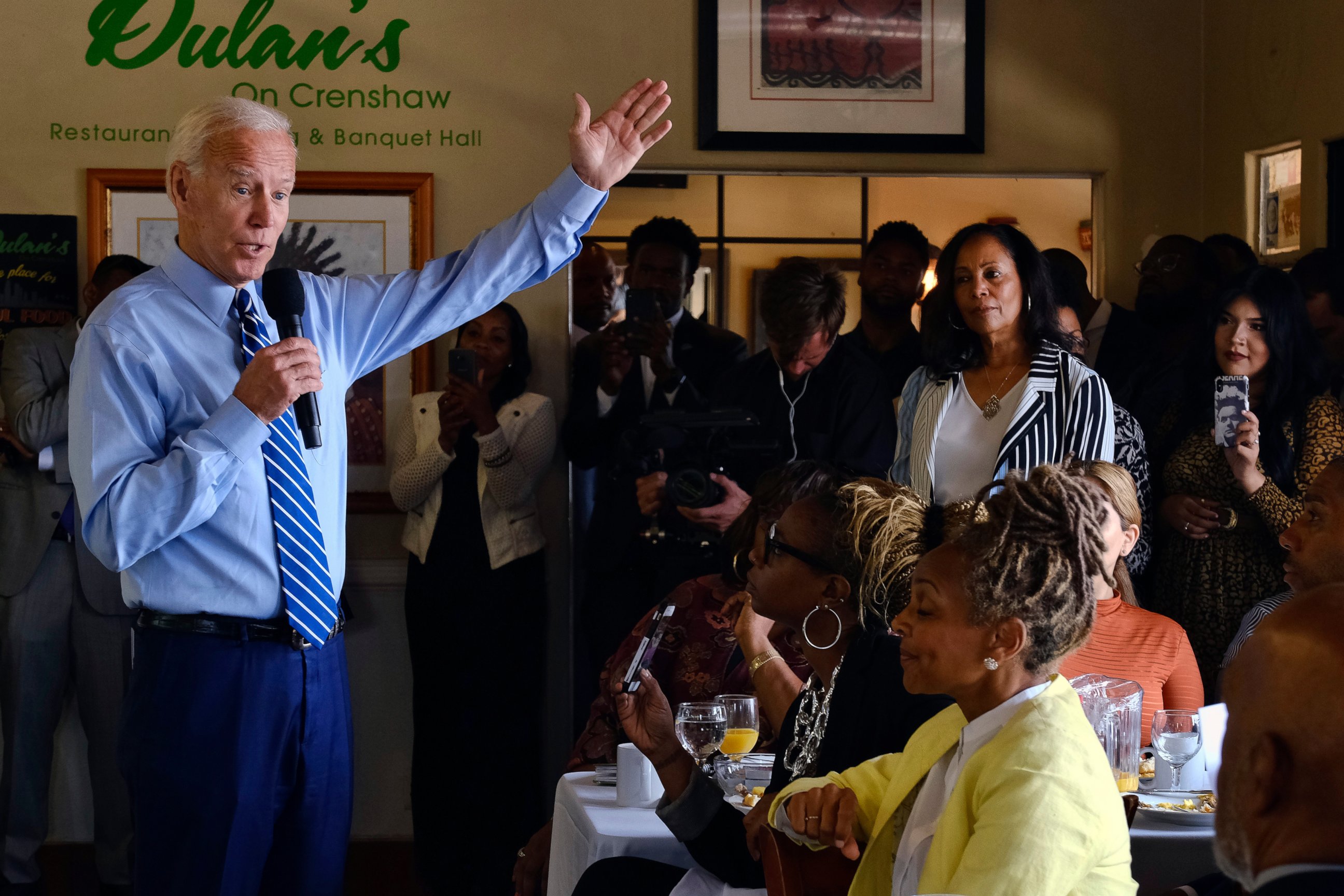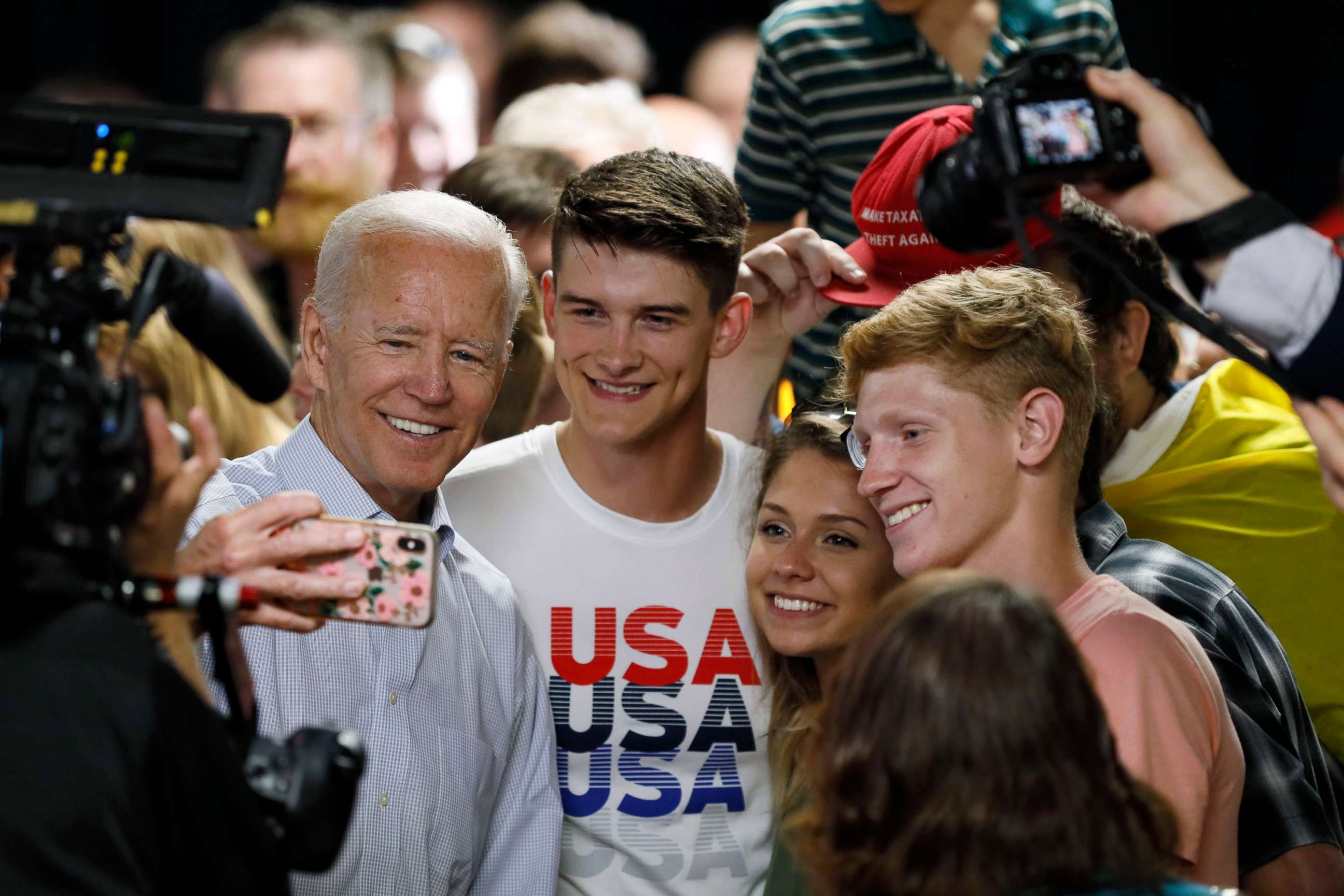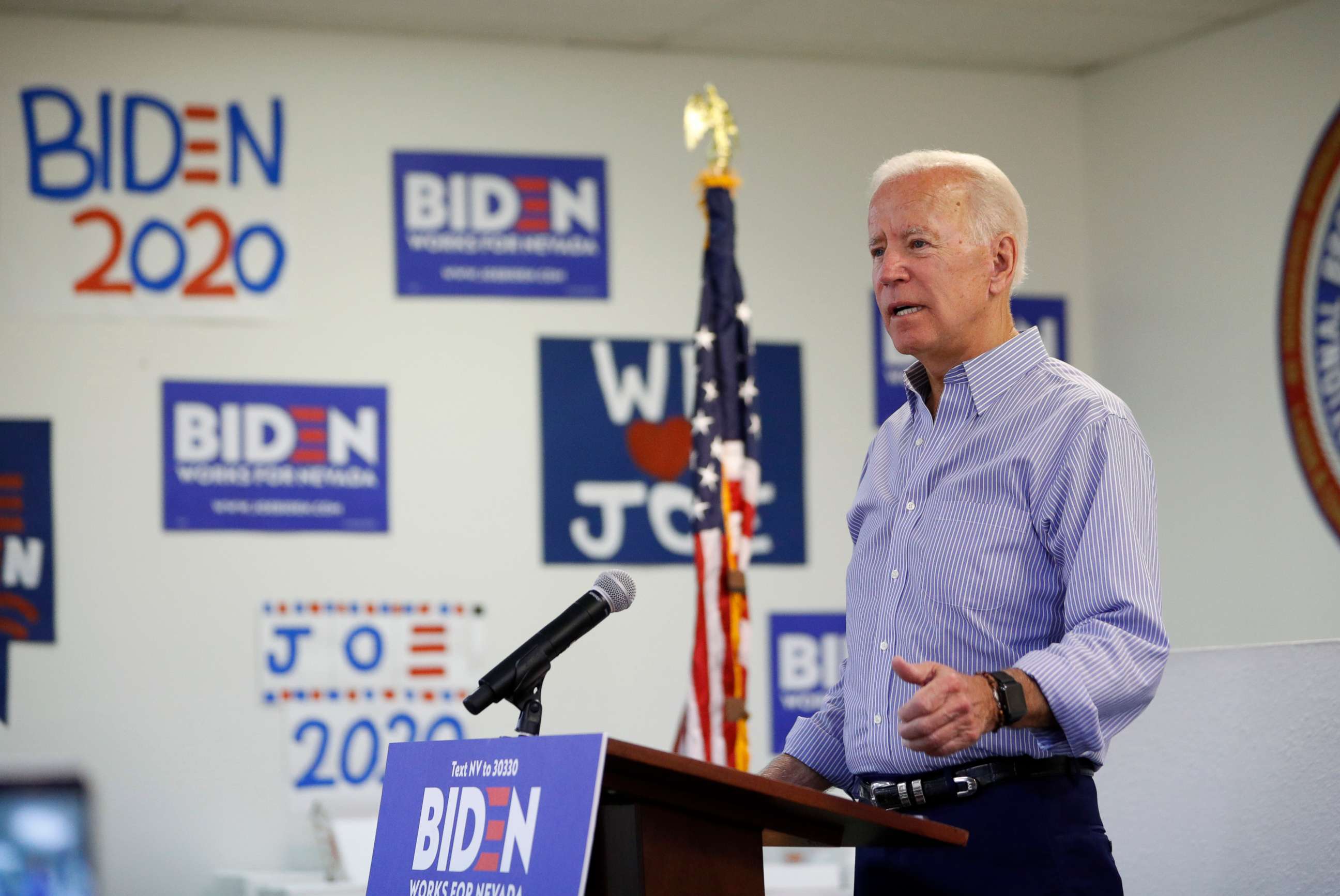Biden defends about face on crime law he helped create
Critics say his crime bill helped lay the groundwork for mass incarceration.
On the heels of his appearance before the NAACP Convention in Detroit former Vice President Joe Biden hit back at criticism of his criminal justice plan -- proposals that, in some ways, would reverse measures he helped put in place -- by attacking the record of one of his most dogged critics, Sen. Cory Booker of New Jersey.
"Look at the mayor's record in Newark," Biden challenged reporters, pointing to a federal investigation over the Newark Police Department's use of stop-and-frisk during Booker's time as mayor of the city.
Earlier in the day, Booker had taken his criticisms of Biden's plan a step further and called the former vice president "an architect of mass incarceration."
The report, which Biden brought up when asked about Booker's earlier comments, found 75% of stops by the police in Newark lacked legal basis, among other issues. Booker and the Newark Police Department cooperated with the investigation and agreed to reforms, according to the Justice Department.
Booker and Biden's back-and-forth centers on Biden's support of the 1994 crime bill, which critics say helped lay the groundwork for mass incarceration.
Their comments have also set the stage for the Democratic debates next week, when Booker and Biden will appear on the same night and are likely to address their differences head on. In a preview of that confrontation, Biden's team has sought to undermine Booker's legacy as mayor of Newark while Booker's team continues to criticize Biden for efforts in the U.S. during his 40-year career that they say ultimately led to mass incarceration.
"I'm anxious to have a debate with Senator Booker," Biden told reporters Wednesday at a campaign stop in Dearborn, Mich., after the NAACP forum, adding that the two candidates will have "time to talk about it" then.
Biden's plan focuses on preventing crime, eliminating racial disparities and providing second chances for those who have had contact with the criminal justice system. But his pivotal role in getting the 1994 crime bill passed while Senate Judiciary chairman complicates his vision for the future.
And while Biden joins fellow presidential hopefuls like Booker, South Bend, Indiana, Mayor Pete Buttigieg and others in releasing criminal justice plans, his calls for the end of mandatory minimum sentences for nonviolent drug crimes -- including some he helped put in place -- will continue to face heightened scrutiny.
The 1994 crime bill gets a lot of attention because “it was the largest crime bill ever passed,” said Lauren-Brooke Eisen, a senior fellow in the Brennan Center’s Justice Program, and the program’s acting director. “There’s a lot of focus on the sentencing aspect of the bill” because it “earmarked funds for states that adopted punitive sentencing laws which required individuals convicted of certain crimes to serve at least 85% of their sentences.”
Eisen noted, that in 2019, a number of lawmakers and candidates are focused on “addressing the need to significantly reduce the number of people behind bars."

The Biden plan calls for treatment for those who suffer from addiction rather than incarceration, increase federal funding for drug courts, and an elimination of the disparity in how crack users and cocaine users are charged and sentenced -- also enacted while Biden served on the Judiciary Committee.
Biden has expressed regret over supporting the past policy, calling it a "mistake" earlier this year, and said in remarks during a National Action Committee Martin Luther King Jr. breakfast in January. that while he hasn't always gotten it right, he's always tried.
On marijuana, Biden – like many other candidates – will decriminalize the drug. The former vice president will also automatically expunge records for those who have been convicted of marijuana-related offenses. Unlike some of his presidential opponents, he does not call for the federal legalization of the drug, but rather for it to be made a schedule II drug so more research can be done on its effects.
Biden's plan calls for an end to private prisons, which Eisen says has become a big issue in the 2020 election. According to the Brennan Center, Biden becomes at least the 11th candidate to call for the end of private prisons.
His plan's focus on juvenile criminal justice reform includes investing $1 billion annually to keep minors from being placed in adult prisons, and expanding after-school programs, community centers and summer jobs funding . The plan provides $20 billion in grants for states that find methods to reduce crime and incarceration, citing a proposal from the Brennan Center.
Biden, like other candidates, would also direct the Department of Housing and Urban Development to only contract with entities open to housing people who who were once incarcerated and are looking for a second chance.
Some of Biden's fellow 2020 Democratic challengers say his plan is too little, too late.
“Joe Biden had more than 40 years to get this right,” Booker said in a statement on Tuesday. “The proud architect of a failed system is not the right person to fix it. The 1994 crime bill accelerated mass incarceration and inflicted immeasurable harm on black, brown and low-income communities. While it’s encouraging to see Vice President Biden finally come around to supporting many of the ideas I and others have proposed, his plan falls short of the transforrmative change our broken criminal justice system needs.”

"We need a nominee in the Democratic Party that understands the crime bill was a mistake," New York Mayor Bill de Blasio told ABC News in May.
And, that same month, President Donald Trump tweeted "Anyone associated with the 1994 Crime Bill will not have a chance of being elected. In particular, African Americans will not be able to vote for you.”
Biden has disputed the idea that the crime bill created mass incarceration, saying at a stop on the campaign trail in Nashua, New Hampshire, on May 14: "Folks, let's get something straight. ... This idea that the crime bill generated mass incarceration, it did not generate mass incarceration."
Still, senior Biden campaign officials say the former vice president expects continued attacks from his opponents on his record including at this week's NAACP gathering, Urban League forum in Indianapolis and the upcoming second presidential debate.
“I have a great deal of respect for Vice President Joe Biden, but I disagree with him,” Sen. Kamala Harris, D-Calif., told reporters in May in Nashua in response to Biden's claims. “That crime bill — that 1994 crime bill — it did contribute to mass incarceration in our country. It encouraged and was the first time that we had a federal three-strikes law. It funded the building of more prisons in the states.”

Biden is not the only 2020 candidate to come under fire for their past record with criminal justice. Harris, who has been critical about the nation's high incarceration rates, has also been criticized for her past work as a prosecutor and California's attorney general -- especially for her campaign against truancy as district attorney. Some have criticized the policy as an attempt to criminalize parents whose children missed more than 30 days of schools.
Biden first unveiled some of his criminal justice reform proposals in late June at the South Carolina Democratic Party Convention.
Biden campaign national co-chair Rep. Cedric Richmond said in an interview on CNN Tuesday that “it’s very clear” that Sen.s Harris and Booker will target crime in the next debate and that Biden will get attacked by his opponents because he is leading the race.
The next debate takes place on July 30 and 31.
ABC News' Averi Harper, Adam Kelsey, Armando Garcia and Justin Gomez contributed to this report




